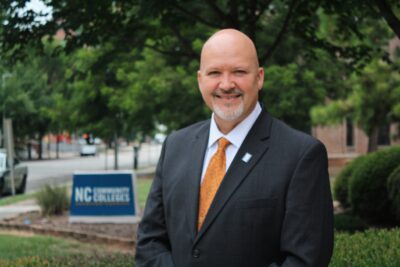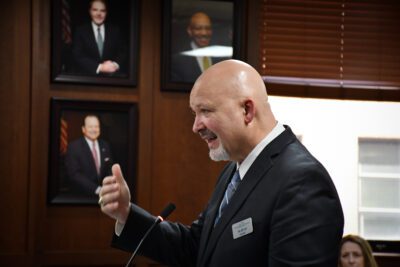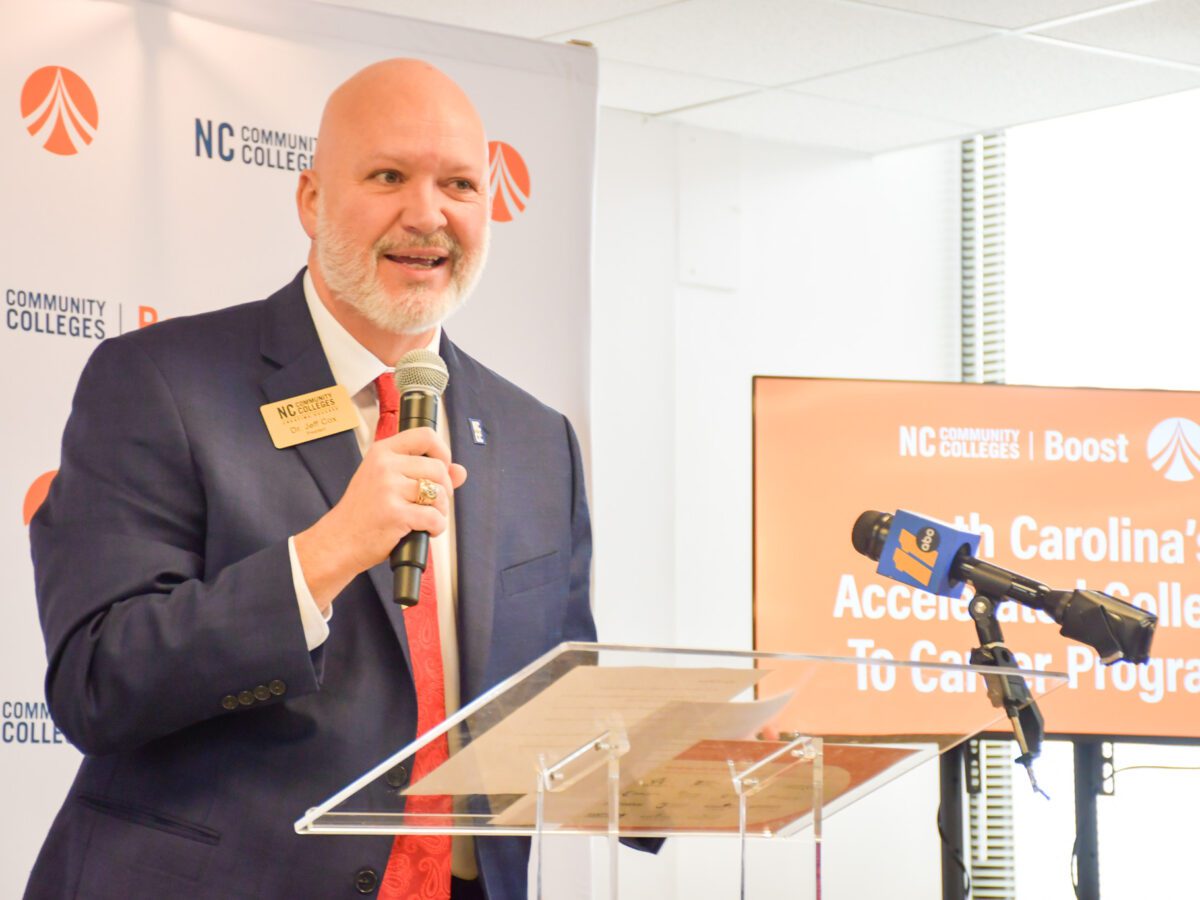
|
|
On Friday, Aug. 1, 2025, Jeff Cox, the president of the N.C Community College System, announced his retirement effective June 30, 2026.
“As a first-generation college student from rural Alleghany County,” Cox said, “I could never have imagined that one day I would lead the state’s community college system. Our colleges play a pivotal role in changing the lives of 600,000+ students every year.”
Cox gave his notice early so that the State Board of Community Colleges would have adequate time to conduct a comprehensive search, he said.
After Cox started, in Sept. 2023, the state budget bill included governance changes that stripped the governor of appointments to the Board and for the first time required confirmation of the next president by the N.C. General Assembly through a joint resolution from both houses.
Cox has served as president since June 1, 2023, and he is the system’s 11th president in the 60 plus years since 1963, when the unified system was codified.
In the last 10 years — since 2015 when then-President Scott Ralls resigned after a seven-year tenure running from May 2008 through Aug. 2015 — seven leaders (note that one served twice) have held the position of interim president, acting president, or president of the N.C. Community College System:
- George Fouts, interim president, 10 months, beginning his service on Sept. 1, 2015
- Jimmie Williamson, president, 15 months, beginning his service on July 1, 2016
- Jennifer Haygood, acting president, 7 months, beginning her service on Oct. 1, 2017
- Peter Hans, president, 27 months, elected on May 1, 2018
- Bill Carver, interim president, 5 months, beginning his service on Aug. 1, 2020
- Thomas Stith, president, 18 months, beginning his service on Jan. 11, 2021
- Bill Carver, interim president, 10 months, beginning his service on July 25, 2022
- Jeff Cox, president, beginning his service on June 1, 2023
Over the last five years, changes — some usual, some unusual — in Board leadership, in Board composition, in leadership of the system office, as well as significant turnover among presidents of the 58 community colleges have all compounded the sense that the system is in a relatively constant state of transition.
Board leadership transitioned from Breeden Blackwell to Burr Sullivan in Sept. 2021 — a transition that was unexpected — and then to current chair Tom Looney in July 2023 after Sullivan’s term expired on June 30, 2023.
In March 2022, EdNC reported, “Within the last few months, nearly half of the Board members turned over…. Having this many new members at one time is a challenge for the Board, Sullivan explained. They need time to adjust to being on the Board, their responsibilities, and the community college landscape in North Carolina.”
Then in Sept. 2023, the legislature changed the law on Board composition. Before the governance changes, the governor had some of the appointment power for Board members, but since 1963 there have only been three Republican governors of North Carolina.
There continue to be 22 members of the Board: the lieutenant governor, state treasurer, labor commissioner, and president of the student government association serve ex-officio, and each house of the legislature now elects nine members to four-year terms. Republicans have controlled the legislature since 2010.
In Nov. 2023, a press release announced that three “heavy hitters” were joining the Board, and at the time, Looney said they were going to help build “a top-down system that reimagines college education and training for all North Carolinians.”
More recently, in July 2025, EdNC reported that six new Board members were sworn in.
Looney and John Kane, the vice chair of the Board, were both named to Business NC’s Power List in 2024 and 2025.
Changes in leadership in the system office featured prominently after the departure of Hans, with the notable loss of Jennifer Haygood to the UNC System. Earlier this year, Patrick Crane, the vice president of strategic initiatives at the system, became the Lumina Foundation’s strategic director for state policy.
Twenty-seven of the 58 community colleges presidents, according to the July 2025 college president status report, have been appointed since 2020, with one college in transition currently. Just eight presidents have been in their current positions for more than a decade.
Read more
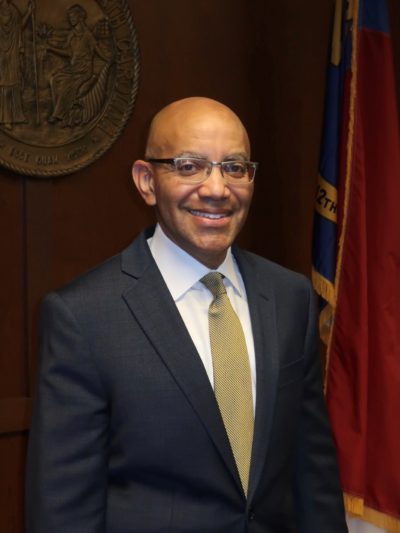
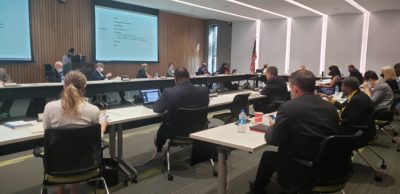
Cox’s leadership
Before becoming system president, Cox served as president of Wilkes Community College for nine years, and earlier in his career, he was the superintendent of Alleghany County Schools.
In Dec. 2021 and then Jan. 2022, while Stith was president, the Board began talking about having goals for the system president. A Board self-assessment, organizational assessment, and a climate survey of the system office all preceded Cox’s leadership.
Cox also inherited a 2022-26 strategic plan adopted when Carver was interim president.
Early in Cox’s tenure, the Board identified goals for his first year, including:
- Leading strategic plan initiatives deemed integral to system impact, including developing an updated funding model, scaling system workforce capacity, and creating a sustainability plan for rural colleges.
- Strengthening system office team and structure.
- Engaging crucial constituencies, including the governor, legislature, partner agencies in education, commerce, and workforce development, and more.
- Facilitating marketing, branding, and communications initiatives.
In Nov. 2024, the Board approved a 10-page performance plan for Cox for 2024-25.
Cox has led recruitment for a significant number of leadership positions in the system office, including Brian Merritt as chief academic officer, Phillip Price as vice chief financial officer, John Loyack as vice president of economic development, Chris Harrington as director of ApprenticeshipNC, and Amy Mast as executive director of State Board relations, among others. A recent round of new hires and promotions was announced in June 2025.
Katie Loovis, the executive director of the North Carolina Community Colleges Foundation, started when Cox did on June 1, 2023. You can find the current system leadership team here.
The press release announcing Cox’s retirement highlights:
- The system’s new vision statement focuses on improving the economic mobility of students while aligning the colleges’ programs to meet the labor market demands in high-wage, high-demand jobs.
- The development and early implementation of Propel NC — a new business model for the community college system focusing more attention on building sustainable funding for high-demand workforce sectors — which was unanimously approved by the Board and the president’s association and has been the system’s priority for state funding from the legislature since then.
- Statewide enrollment recovery following the pandemic, including the highest enrollment jump in 15 years.
Under Cox’s leadership, the system launched the Rural Postsecondary Practices Partnership (RP3) — a collaborative effort involving the system, the Belk Center for Community College Leadership and Research, myFutureNC, and EdNC.
Cox deepened partnerships with NC-based philanthropy, including the John M. Belk Endowment, which is on track to visit all 58 community colleges by 2026. In Feb. 2025, Arnold Ventures announced a $35.6 million investment — the largest private grant ever received by the system — for Boost, an accelerated college to career program.
Cox also led through crisis.
When Hurricane Helene hit, the system, Board, and foundation quickly mobilized to create the Hurricane Helene Community College Response and Recovery Fund. Helene impacted 14 of the state’s community colleges, representing more than 6,000 faculty and staff and nearly 74,000 students. As of Feb. 2025, the foundation had distributed $560,000 across four rounds of funding to the affected community colleges.
Cox wrote, “Community colleges will help displaced workers get back on their feet, while strengthening workforce pipelines for local economies across western North Carolina.”
Read more


The process for transition, then and now
The system press release says, “The State Board of Community Colleges will outline a formal transition process in the months ahead.”
Here is how the process to hire Cox unfolded, according to our reporting.
The search for a new president began after then-system president Thomas Stith resigned on July 19, 2022. The following day, the system named former Nash Community College President Bill Carver as the interim system president for the second time. Carver was also the interim president after Peter Hans left the system office to become president of the UNC System.
On Aug. 22, 2022, the State Board of Community Colleges named a bipartisan search committee consisting of 10 Board members and four other individuals. You can see who served on the search committee here.
The Board also voted to hire a firm experienced in higher education leadership searches. Buffkin/Baker was ultimately the firm selected to manage the process.
In Oct. 2022, the search committee discussed a profile for the ideal system president candidate. They also previewed questions they would later pose in a survey of key stakeholders across the state.
The survey results were released in Nov. 2022.
In Dec. 2022, the committee finalized a job posting for system president. The job officially posted in Jan. 2023.
The search committee began vetting candidates at their March 1, 2023, meeting. Buffkin/Baker brought at least a dozen candidates before the committee. Ultimately, the committee chose to interview 10 candidates in early March.
The next phase came on April 11 and 12, 2023, when the search committee and the remaining state board members interviewed three finalists. The finalist pool was made up entirely of individuals serving in community college leadership roles, including one from Colorado.
On April 21, 2023, the selection of Cox was announced.
New to the process this time around will be confirmation by the legislature.
N.C. General Statute 115D-3 now says,
Subject to confirmation by the General Assembly in accordance with G.S. 115D‑3.1, the State Board shall elect a President of the North Carolina Community Colleges System who shall serve as chief administrative officer of the Community Colleges System Office. The State Board shall use the following process to elect a President:
(1) At least three final candidates shall be submitted to the full State Board from which the full State Board shall make its election.
(2) The State Board shall conduct a vote on the election of the President, and the candidate who receives a majority of votes of the entire State Board shall be elected President.
N.C. General Statute 115D-3.1 legislates the confirmation process:
(a) The State Board shall submit the name of the person elected as President for confirmation to the presiding officers of the Senate and the House of Representatives of the General Assembly on or before the fifteenth day following the election. The General Assembly shall adopt a joint resolution to either (i) confirm or (ii) deny confirmation, subject to the following:
(1) The person elected by the State Board shall not serve as President but may serve as interim‑President until the General Assembly adopts a joint resolution.
(2) If the General Assembly fails to adopt a joint resolution confirming the person by the date that either chamber reaches the thirtieth legislative day following the receipt of the name by the presiding officers, it shall be deemed that the General Assembly has denied confirmation.
(b) A person denied confirmation shall not serve as President or interim‑President.
Why this job matters to the future of North Carolina
The job of president of the system is challenging given the number of stakeholders who need to have buy-in to the leadership, including state elected leaders, the Board, the system office, the presidents of the 58, the boards of trustees for the 58, and increasingly external stakeholders, like industry partners and philanthropists.
And yet strong, stable leadership is needed given the importance of workforce to the state’s No. 1 for business ranking, their $19 billion-plus impact on the state economy, the state’s attainment goal for 2030, and the closing of the open door that has long-defined access to community colleges across North Carolina.
Nationally, this transition is happening at a moment when public perception of community colleges is higher than four-year institutions, is on the rise, and is increasing most among Republicans, according to a recent survey.
It is happening at a moment when long-held beliefs and policies that have traditionally limited the role of community colleges compared to four-year institutions are being reconsidered. For instance in 24 states, more than 200 community colleges now offer four-year degrees.
This transition is happening at a critical moment here in North Carolina, too, given the long term recovery facing western North Carolina, additional pressure on the state budget from changes in federal policy, a mini-budget for 2025-26, the need to secure full funding from the legislature for Propel NC, the launch of Boost this fall, and the end of the current strategic plan in 2026.
“With 58 colleges spanning 100 counties, nearly every North Carolina resident is within a 30-minute drive of high-quality, affordable higher education and professional development,” says the system website.
“Dr. Cox stepped up at a critical moment and brought much-needed stability and experience to the system, serving with heart,” said Looney in the press release. “We thank him for his service and unwavering commitment to our colleges, students, and communities across North Carolina.”
Amanda Lee, president of the North Carolina Association of Community College Presidents, said in a statement to EdNC:
Dr. Cox has been a steadfast advocate for student success, workforce development, and educational access throughout his career. His vision, collaborative spirit, and commitment to advancing North Carolina’s community colleges have left a lasting mark on our state. Under his leadership, the System has strengthened its role as a vital driver of economic mobility and community growth.
We are especially grateful for Dr. Cox’s ability to bring stakeholders together — whether state leaders, industry partners, or local communities — to champion the essential role of our colleges in shaping North Carolina’s future. His retirement marks the close of a chapter, but his impact will continue to be felt across our institutions and among the countless students whose lives have been transformed through education.
Many think the return on investment (ROI) for community colleges is higher than ever before, warranting significant state and federal funding shifts.
The question is who will take the lead.
Editor’s Note and Correction: The John M. Belk Endowment and Arnold Ventures support the work of EdNC. John Kane’s name has been corrected.
Recommended reading
